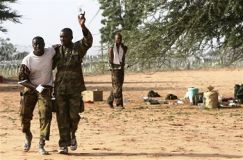Sudan’s Darfur crisis needs urgent solution – Diplomats
October 2, 2997 (WASHINGTON) — On Tuesday, the Embassy of the Republic of the Sudan stated that a “deliberate and sustained attack” by 30 vehicles carrying over 1,000 heavily armed personnel against African Union peacekeepers just goes to show urgent nature of Sudanese and international efforts to bring a unified solution to the crisis in Darfur and the nearby regions.

At least 10 A.U. soldiers were killed, several others were wounded, and more than 50 remain unaccounted for after the attack came against the peacekeeping base in Haskanita. It is believed that the timing of the attack shows that some rebel groups want to discourage other nations from contributing to the new peacekeeping mission for the region while at once complicating and crippling the upcoming peace talks set for later this month in Libya.
The embassy of the republic of the Sudan in Washington, D.C. has emphatically condemned the attack on the peacekeepers.
“Not only was it a flagrant violation of the ceasefire but an unconscionable crime that breaks every convention and norm of international peacekeeping,” said Rodolphe Adada, political head of the hybrid force operation in Darfur.
The nation of the Sudan runs red with the blood of millions of innocent men, women, and children who have died during a long and bitter North-South civil war, which has over time constituted something akin to genocide.
The “Darfur Peace Agreement” (DPA), signed in 2006, has reduced a lot of the violence, but sickness and lack of food remain constant problems. The UN sent 27,000 African Union United Nations peacekeeping troops to the Sudan in July.
Sudanese President Omar al-Bashire and his fundamentalist Arabic-Moslem government are thought by some to be supporting armed groups of rebels in the southern part of the nation. Meanwhile, al-Bashire also ignores the “Comprehensive Peace Agreement” (CPA) of 2005 which acknowledges a north-south divide in the Sudanese nation. There are numerous rebel groups roaming the fractured country.
In Darfur the Arab Janjaweed, “devils on horseback”, remain heavily armed, with many having been absorbed into the Sudan Army and Border Security forces.
The agreements include transparency of oil revenues in the nation, intended to facilitate revenue sharing for the betterment of the people, but this transparency is denied. Sudan has vast oil reserves, many untapped, and there is global concern that the oil revenues could fall into the hands of radical Islamic fundamentalist groups who could use the money to finance terrorism and militant conquests.
“We can only hope that this horrible assault galvanizes the international community, world leaders and all those concerned for peace and stability in the region to send a strong message to the perpetrators and hold them fully accountable for this tragic incident as well as applying immense pressure on all the parties and factions to come to the negotiating table to give peace a chance,” said Seif Yasin, Press & Information Counselor.
(AP)
